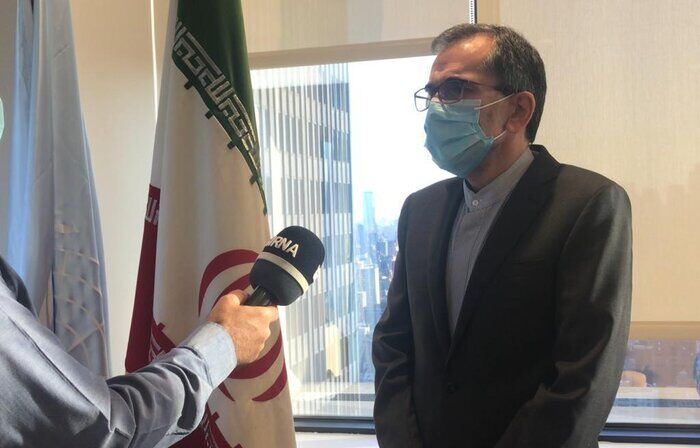That the UNSC rejected the draft proposed by the US to extend arms embargo on Iran indicated US isolation internationally, Majid Takht Ravanchi told IRNA in New York on Friday afternoon.
US Security Council's Friday vote means US total isolation, the ambassador said.
He described the US effort as a failed policy from which the American officials should learn a lesson.
Even its close partners [and allies] did not accompany the US, the ambassador noted.
United States has no policy, i.e. it cannot be called "diplomacy," Takht Ravanchi stressed.
The today vote, one one hand, made the US be faced with a failed project; and on the other hand, it indicated that the international community will not accompany [the US] to misuse the Resolution 2231, the ambassador underlined.
US is no longer a member of the July 2015 nuclear deal, aka Joint Comprehensive Plan of Action (JCPOA), because it withdrew unilaterally from the international deal in May 2018.
Would it be possible that one withdrew from the JCPOA two year ago and imposed the maximum level of sanctions despite the context of the UN Security Council Resolution 2231, then claims today that it is still a member of the deal, the ambassador asked.
So, the US [anti-Iran] move has no legal basis, he said, adding that the UNSC vote against the US resolution also indicated that to what extent the US officials are politically motivated.
Also about "Snapback" mechanism referred to by the US officials about re-imposition of sanctions, Takht Ravanchi said it is completely groundless and is clear from the point of view of the international law.
The JCPOA is part of the Resolution 2231, so the US is responsible to implement it according to the Security Council Resolution and the UN Charter, he noted.
However, the American officials claim that they are two separated issues, while they are inseparable, he added.
He went on to say that US claims that its withdrawal from the JCPOA did not hurt the Resolution 2231.
Resolution 2231 (2015) urges full implementation of the JCPOA on the timetable set by the context of the Agreement and sets forth the next steps for the eventual removal of Security Council sanctions on Iran.
Asked what basis is behind the US President Donald Trump's claim over reaching quick deal with Iran if being re-elected, Takht Ravanchi said Trump had over three years time, but he took hostile measures [instead of efforts to reach a deal].
Trump is playing with words, so no one cares about his remarks, he underlined.
Censuring the US for its anti-Iran measures, the ambassador said Washington left the JCPOA in total disregard of the International Law, reimposed sanctions despite the Resolution 2231 and caused the Iranian people a lot of damages for which it should be held accountable.
Further, the ambassador thanked Russia and China for opposing the US resolution strongly.
As Takht Ravanchi said, the two veto-wielding states are "our close partners" with "very good political and trade relations."
Tehran has close cooperation with Moscow and Beijing in the international arena, he added, underlining that such cooperation shows depth of friendship between Iranian nation with both Russian and Chinese nations.
Referring to remarks made by his French counterpart that Iran should fully be faithful to its commitments to the JCPOA, Takht Ravanchi said Europeans have made efforts to preserve the 2015 nuclear deal; however, the [European] members of the deal have sometimes not been committed to the international nuclear agreement in spite of the fact that it is part of their international commitments.
The ambassador stressed that the JCPOA can be sustainable when Iran benefits from it.
US exit from the deal and Europeans' unfaithfulness to their commitments have created obstacles for Iran to get benefit from the JCPOA, he concluded.
1483**1416
Follow us on Twitter @IrnaEnglish



Your Comment